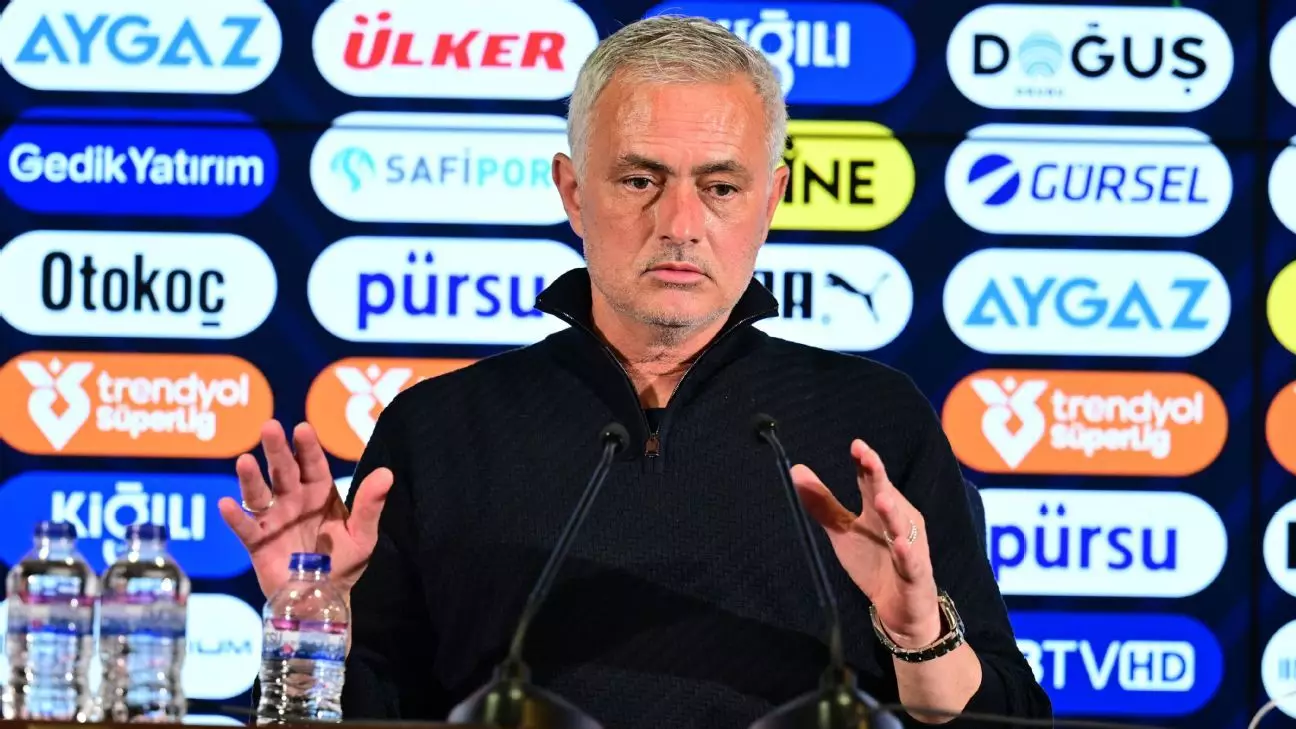José Mourinho, a name synonymous with football success, finds himself at a crossroads as the head coach of Fenerbahce. Following a frustrating 1-0 defeat to arch-rivals Besiktas, Mourinho has chosen to remain noncommittal about his future with the Turkish club. Currently, Fenerbahce sits second in the Super Lig, eight points behind leaders Galatasaray, leaving fans to grapple with the reality of another barren season without a league title. It’s a position that not only weighs heavily on the club’s historic ambitions but also on Mourinho’s own legacy as a manager who thrives on success.
Mourinho’s contract with Fenerbahce, initiated with high expectations of securing their first league title in a decade, seems to be slipping through his fingers. His assertion that he will not discuss next season publicly emphasizes a blend of professionalism and perhaps an acknowledgement of the precarious situation he finds himself in. While respecting the internal dynamics of the club is crucial, one must ponder how long the board will tolerate mediocrity. Fenerbahce fans expect more; will Mourinho’s silence speak louder than words in this climatic juncture?
Refereeing and Rivalries
In his post-match comments, Mourinho hinted at a “toxic” atmosphere within the Super Lig. His frustration towards perceived preferential treatment towards Galatasaray comes from a blend of competitive spirit and a mad desire for fairness in officiating. One of the most potent challenges for Fenerbahce has been overcoming the mental hurdles imposed not just by competing teams but also by a structured “system” that he claims is deeply entrenched within the league’s framework.
Addressing the issue of referee bias goes beyond mere complaints; it reveals an underlying challenge that Fenerbahce must face to regain its competitive edge. Mourinho’s illuminating comments should compel the Turkish football authorities to reflect on the integrity of the league. Acknowledging and rectifying these discrepancies could be key to elevating not just Fenerbahce but the entire sporting landscape in Turkey.
The Resilience of a Coach
Despite the turmoil, Mourinho demonstrates a resilience that is characteristic of his storied career. When asked for advice on how fellow manager Ole Gunnar Solskjær should navigate his own challenges with Besiktas, Mourinho chose not to impose his wisdom. Instead, he emphasized the mutual respect that exists between them as colleagues. This echoes a lesson for the modern football landscape: managers are not only leaders but also part of a fraternity with the shared burdens of coaching.
Mourinho’s rejection of entitlement to critique indicates a level of emotional intelligence; he recognizes that every manager has their struggles, no matter the pedigree. This philosophy is refreshing yet sobering, especially when juxtaposed with the immediate pressures that fans and officials place on their respective teams. His ability to minimize the personal toll of such losses—rendering the spotlights and headlines surrounding defeat less consequential—is a testament to his experience.
The Pressure Cooker of Fans’ Expectations
As passionate supporters voice their displeasures, Mourinho has openly accepted the criticism that comes with not meeting expectations in such a fervent football culture. His acknowledgment that reactions from fans are normal underlines an understanding of the emotional investment that supporters have in their respective clubs. It’s a potent reminder that football transcends tactics and formations. It is about heart, drama, and the community that rallies behind these teams.
It is this very relationship between fans and coaches that shapes the atmosphere surrounding the club. Mourinho’s ability to embrace this intensity without succumbing to it could serve as an example for future managers. A loss in a derby is more than just a statistic; it’s a blow to the ego of a beloved institution. The question remains: will he be given the time and space to correct the ship he commands?
A Future Shrouded in Uncertainty
José Mourinho stands at an existential turning point with Fenerbahce. He has embraced the challenges, voiced the frustrations, and shown humility in the face of criticism. But as the clock ticks down on the season with no title in sight, one cannot help but ponder whether sweet talking history will be enough to keep Mourinho at a club filled with ambition. As the dust settles on this season, both Mourinho and Fenerbahce could benefit from a rigorous self-examination to recalibrate and redefine their paths. Ultimately, the future hangs delicately in the balance, awaiting the next decisive move in this high-stakes game.


Leave a Reply